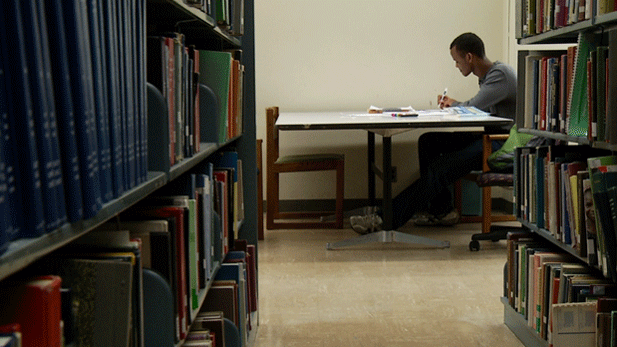 Hussein Magale, now a University of Arizona sophomore studying biochemistry, fled Somalia during its civil war.
Hussein Magale, now a University of Arizona sophomore studying biochemistry, fled Somalia during its civil war.Civil war destroyed Hussein Magale’s home in Somalia in 1992, when he was around two years old. Forced to flee, he spent the next 16 years in a Kenyan refugee camp.
“I was born in Somalia, raised up in Kenya, now I’m switching over to being an American,” he said.
A United Nations program resettled him in Tucson three years ago. Less than a month after escaping Kenya, he enrolled in Catalina High School. Today, he’s a student of the University of Arizona and frequently volunteers to help other refugees.
The biggest difference between the education system in a Kenyan refugee camp and a Tucson public school is a lack of resources in the former, Magale said.
In the camp, 20 students would share one textbook, and when finals came around and the need to study intensified, fights would break out among the pupils.
“Getting an education in a refugee camp is not a right, it’s a privilege,” Magale said. “This problem is mostly suffered by the youth, who have lost what should have been the most informative, promising and exciting times of their life.”
The camp suffered from worse circumstances than a shortage of supplies. There was the constant death of other refugees, especially the suicides of children his age. Magale said his graphic memories continue to motivate and horrify him.
Disfigured and injured people flowed into his camp non-stop, many from neighboring areas plagued with violence. A lot of them would die waiting for help, he recalled; the scent of their decaying flesh would fuse with the odor of garbage that was prevalent throughout the camp.
He said the Kenyan government was indifferent to the refugees’ suffering.
“(People) live in an open prison, far away from justice and humanity,” Magale said. “They speak, but their voices are never heard.”
Doctors Without Borders, a humanitarian organization, eventually came to his camp. So Magale, who speaks three languages, began translating for them.
“If they (doctors) were not like that, I wouldn’t have survived,” he said. “Working with them ... I understood the power of a medical education.”
Now, he’s a biochemistry sophomore and an aspiring doctor. He translates for the University of Arizona Medical Center’s doctors and assists the Arizona Refugee Connection, which helps people worldwide.
He still has a lot of work ahead of him and medical school is some time away, but his goals for the future are very clear.
“When I become a doctor,” he said, ”I’m planning to not only help Somalia or Somali refugees, but anyone who needs it most.”

By submitting your comments, you hereby give AZPM the right to post your comments and potentially use them in any other form of media operated by this institution.